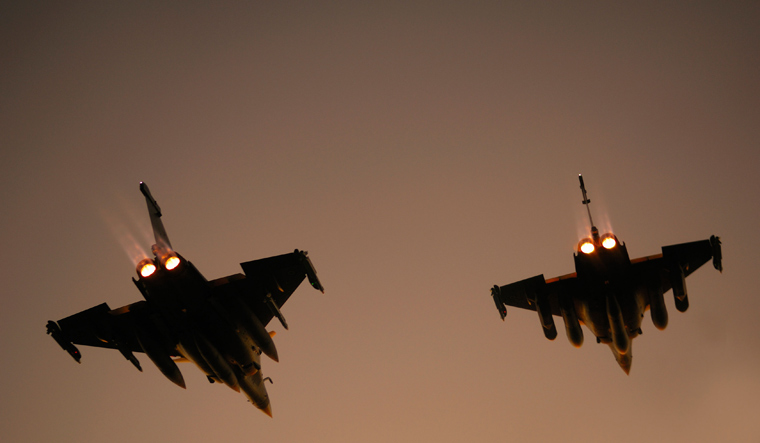After over four hours of power-packed hearing—closely watched by political and defence circles —the Supreme Court on Wednesday decided to reserve its order on the PILs seeking a court-monitored probe into the procurement of 36 Rafale warplanes from France.
Now all eyes will be on the final decision of the top court as the issue has already sparked off an uproar in the country, especially in the high-voltage political atmosphere ahead of the upcoming general election next year.
A bench comprising Chief Justice Ranjan Gogoi and Justices S.K. Kaul and K.M. Joseph made the decision after hearing the government, the Indian Air Force and the petitioners.
On Monday, the government had submitted the details of the decision-making process of selection of Rafale fighter planes, including the pricing details, which were submitted to the court in a sealed cover.
Defending the government's decision to not reveal the price due to the secrecy clause, Attorney General K.K. Venugopal said that India's adversaries might get an advantage if the entire details of the pricing were disclosed.
Arguing for the disclosure of the price, lawyer-activist Prashant Bhushan had accused the government of hiding behind the secrecy clause. He alleged that the price per aircraft was hiked by 40 per cent compared to the previous deal of 126 Rafale jets.
Bhushan had also asked for examining the contention of the government that the reason for scrapping the 126-aircraft deal was the differences between French aerospace company Dassault Aviation and the Hindustan Aeronautics Limited.
Earlier, Air Vice Marshal T. Chalapthi and Deputy Chief of Air Staff V.R. Chowdhuri, along with two other officers, were called in to give more explanation to the court. The IAF officials informed the court that the Sukhoi 30s, the third generation aircraft, were the latest to be inducted into the force. They added that the IAF needed fourth or fifth generation aircraft in its fleet and the selection of Rafale jet happened because it is a fourth-plus generation fighter jet.
The attorney general, while concluding his argument, said: "The IAF has been writing to the government that it will be difficult for them to defend the country due to shortage of aircraft; we have fallen behind a lot".
The attorney general also raised the issue of whether the court is competent to judicially review this on the basis of what has been submitted (by the petitioners).
In its submitted reply, the government had earlier claimed that the combined effect of IAF's reducing combat potential and India's adversaries enhancing their combat potential have made the situation ''asymmetrical” and extremely critical.
“They (adversaries) acquired better capability air-to-air missiles and inducted their indigenous fighters in large numbers. Further, they modernized and inducted aircraft with advanced weapon and radar capabilities," the government said in the details submitted to the apex court. It added that "As per available information, our adversaries inducted more than 400 fighters (equivalent to more than 20 squadrons) during the period from 2010 to 2015. They inducted not only the fourth generation aircraft but also the fifth generation stealth fighter aircraft."
The government also informed the apex court that there was no sovereign guarantee from the French government on the delivery of 36 Rafale jets but there is a 'letter of comfort' from the French prime minister.



